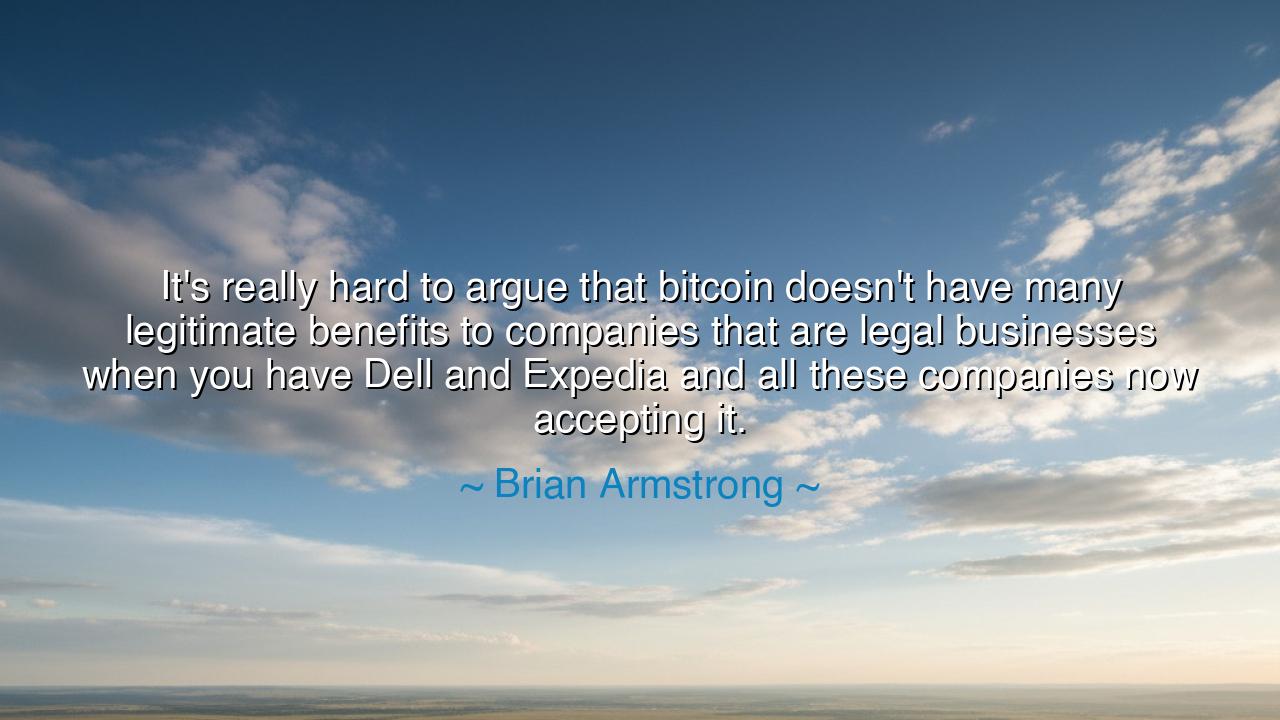
It's really hard to argue that bitcoin doesn't have many
It's really hard to argue that bitcoin doesn't have many legitimate benefits to companies that are legal businesses when you have Dell and Expedia and all these companies now accepting it.






Hear the words of Brian Armstrong, a pioneer of the digital age, who proclaimed: “It’s really hard to argue that bitcoin doesn’t have many legitimate benefits to companies that are legal businesses when you have Dell and Expedia and all these companies now accepting it.” These words are not idle chatter, but a reflection of a revolution in money itself, a revolution as profound as the shift from gold to paper, from barter to coin. They speak of the rise of a new instrument of commerce, one born not of kings and treasuries but of mathematics, code, and the will of free men and women to transact beyond borders.
When Armstrong speaks of legitimate benefits, he acknowledges that the world looked upon bitcoin with suspicion, calling it a tool for criminals or a fantasy for dreamers. Yet he answers with proof: if great merchants such as Dell and Expedia, pillars of the modern marketplace, have embraced it, how can one still claim it has no value? The adoption by respected companies reveals that this currency is not a mere shadow, but a tool that serves real needs: faster payments, lower costs, and access for those locked out of traditional banks.
The deeper truth in his words lies in the phrase “legal businesses.” For Armstrong draws a clear line between lawlessness and legitimacy. Bitcoin is not condemned to the realm of smugglers and cheats; it can dwell also in the halls of lawful commerce. Its power lies in being borderless, decentralized, and incorruptible, and such qualities, when placed in the hands of companies that honor law, can be harnessed for prosperity rather than ruin. Thus, Armstrong elevates bitcoin from suspicion to respectability, from rebellion to responsibility.
History offers us a reflection in the tale of the Medici bankers of Renaissance Florence. In a time when trade spanned continents and gold could not flow swiftly enough, they invented systems of credit and letters of exchange. At first, many feared and mistrusted these innovations, thinking them tools for trickery. Yet as great merchants and cities began to use them, they transformed commerce, enabling the Renaissance to flourish. So too with bitcoin: what was once dismissed as dangerous may, through adoption, become the foundation of a new age of trade.
Armstrong’s words also remind us that technology alone is not enough; it must be legitimized through use. A tool, however brilliant, proves its worth not in theory but in practice. When merchants accept it, when customers trust it, when governments recognize it, then it ceases to be experiment and becomes infrastructure. The legitimacy of bitcoin, therefore, is not won in arguments alone, but in the lived reality of commerce across the globe.
This is a heroic call to embrace change with discernment. For many fear what is new, clinging to the familiar even as it decays. Yet Armstrong points to the future, showing that great companies have already stepped forward. His words urge us to see not only the risks of innovation, but also the opportunities, and to judge not by fear but by the fruits that emerge when the new is tested in the fire of real life.
Children of tomorrow, let this lesson rest in your hearts: do not dismiss the unfamiliar simply because it is new. Weigh it, test it, and ask whether it brings greater justice, freedom, and prosperity. If it does, then embrace it with courage, even when the world scoffs. Support innovations that widen access, reduce barriers, and empower the powerless. For in so doing, you carry forward the eternal work of progress.
Thus the wisdom of Armstrong’s words endures: that bitcoin, like all great innovations, is proven not by arguments of its critics, but by the hands of those who use it well. Its adoption by lawful merchants is the sign of its legitimacy, and its promise lies in how humanity chooses to wield it. Let us therefore be wise stewards, harnessing new tools not for greed alone, but for the building of a fairer, freer, and more enduring world.






AAdministratorAdministrator
Welcome, honored guests. Please leave a comment, we will respond soon